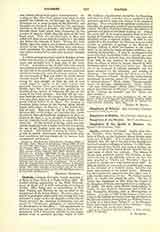

Daulia, a titular see of Greece. Daulis, later Daulia, Dauleion, often Diauleia, even Davalia, was a town of Phocis, on the Cephissus, fifteen Roman miles northeast of Delphi. It is mentioned by Hierocles (Synecd., 643, 10), and at the end of the seventh century had become a suffragan of Athens. In 1393 Talantion was cut off from Daulia and made a distinct see: this was a town at the foot of Mount Knemis, the ancient name of which was Atalante. The bishops of Daulia long protested against this division; at last, about the end of the fifteenth century the two sees were reunited as “Daulia and Talantion”; they remained so, except for a brief period about 1567. In 1653 the double see was made an archbishopric, owing to the influence of a Turkish pasha, but after two years was reduced to its former status. Talantion was then commonly named in the first place, and finally was the only name in use. The bishop resided there, as Daulia was almost in ruins. The See of Daulia was suppressed in 1833, when the Church of the Kingdom of Greece was organized on an independent basis. We know about fifteen Greek bishops of Daulia, the first of whom, Germanos, died in 919; the last, Neophytos Metaxas, died as Metropolitan of Athens. As early as 1205 Daulia became a Latin see; many of the bishops are known from the thirteenth to the fifteenth century, among them one William, bearer, in 1384, of a letter from Urban VI to the Patriarch Nilus, concerning the reunion of the Churches. Since 1441, at least, the see has been titular.
S. PETRIDES

